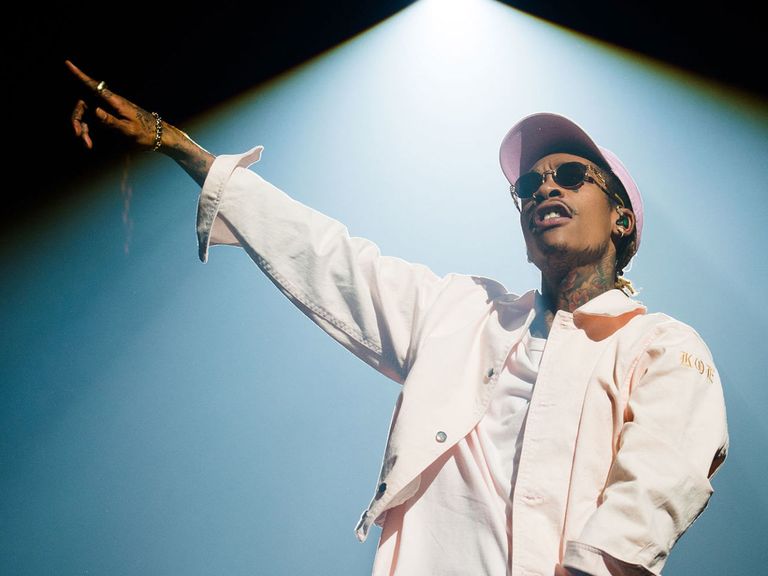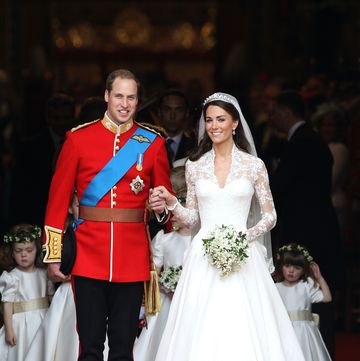WIZ KHALIFA IS SITTING ON A PURPLE VELVET ARMCHAIR IN A HOUSE IN THE HOLLYWOOD HILLS EXPLAINING THAT HE DOESN'T THINK I AM A BITCH... 'If I call a woman a bitch, it's not [towards] all women,' he says, leaning forwards to make his point more clearly. 'It doesn't mean that you're a bitch.'
'Thank you', I say. How kind. To backtrack: we're half- way through the interview and it's going pretty well. We've covered the necessary ground: he's talked about his sixth studio album Khalifa, his tendency to self-critique ('I'm just really, really picky') and the fact that he wrote his first rap at the age of eight ('It was about just being cool'). He was only 20 minutes late for our interview, which in the world of hip-hop stars is admirably punctual.
At 28, the Pittsburgh-raised Khalifa – real name Cameron Jibril Thomaz – has already released a string of hit songs, such as Black And Yellow, We Dem Boyz and See You Again (used on the Furious 7 soundtrack). He's taken part in high- profile collaborations, recorded with artists such as Snoop Dogg and Miley Cyrus, has been nominated for 10 Grammy awards and won three Billboard awards. He was also married to self-proclaimed feminist, model and actress Amber Rose, with whom he has a three-year-old son, Sebastian.
In person, he is polite, engaged and smart. So how can he square all that with the retrograde and misogynistic content of some of his lyrics? Why is it OK to repeatedly refer to women as 'bitches' and 'hos' and why, in the song Hustlin', does he rap about a 'bad bitch, she sucks me while I'm rollin' up / Throw a stack at that bitch ass / And make her pay her rent with it'?
'It's a double-edged sword,' he says, impressively unperturbed by the question. 'I love women. I look up to women. Women are smart. They're the smartest creatures on Earth. They need to be empowered and respected. But some of the women we see in our [hip-hop] community – a lot of the ones that we talk about, who we don't have respect for – are the ones who come out in the music. That's why you hear those words.' He breaks off to take a drag from a huge joint as casually as other interviewees might sip on a cup of coffee.
'At the end of the day, where we could be a little bit more sensitive, I feel as hip-hop artists we just take the realer route and we talk about more of what we see.' So he's talking about specific women who act in a certain way to promote their own interests?
'Yeah. It means that I probably met some bitches in my life who did some things. There are women in the industry who use what they know to get ahead. We use our words, they use their bodies – it's an understanding. I would never call my mom a bitch, my little sister a bitch... I would never disrespect a woman just because she's a woman, you know?'
But it's a bigger issue than just one artist. Referring to any woman in such derogatory terms plays into promoting a culture where it's acceptable to view the female gender in a negative way. The young boys who buy Khalifa's records probably don't get the subtlety of his distinction. He's by no means the worst offender; his mentor Snoop Dogg and other artists, such as Rick Ross and Lil Wayne, are guilty of far more aggressive sexism in their lyrics. Hip-hop has a long and ignoble history of misogyny. Its vernacular was minted in a society plagued by racism, poverty and illiteracy, where economic and social frustrations were daily realities for young black men who were more likely to go to prison than university. The first hip-hop artists were angry at everyone, including women.
For some, like Khalifa, the occasional sexist lyric is a nod to hip-hop's traditions. Still, it is absolutely not OK. Anything that a man in a position of power does to objectify women or treat them as lesser beings is sexism. As the film director Ava DuVernay put it: 'To be a woman who loves hip-hop at times is to be in love with your abuser.' And yet, I do love hip-hop. It's tricky because I have no defence for the fact that I know all the words to Ice Cube's No Vaseline and do a mean SkeeLo at karaoke. Ultimate- ly, I love the music, the beat and the passion behind some of the world's greatest rap tracks. I like listening to hip-hop,but I realise it makes me a hypocrite.But I don't let hip-hop's perception of women define me.
And I take heart from the fact that things are changing (slower than I'd like, admittedly, but at least going in the right direction). There are female rappers such as Queen Latifah and Missy Elliott redressing the balance, while artists including Snoop Dogg have softened their lyrics in recent years. In 2011, Kendrick Lamar rapped about women not needing to wear make-up.
Does Khalifa think hip-hop music would be less popular if the language changed? 'Yeah. Just thinking of me as a kid: I thought jokes were funnier with cuss words. People just like their music more raw.'
Khalifa is good at rawness. He speaks like he raps – with unfiltered honesty. He says he always felt destined for great- ness, partly because of his name, which is inspired by his Muslim ancestry. 'My uncle's name was Knowledge Colossal,' he explains. Knowledge Colossal? That's the best name I've ever heard. Khalifa laughs. 'I know! I wanted one to match so he called me Wisdom. And I needed a last name too; Khalifa is Arabic and it means "successor". It's some- body who spreads the word.'
Khalifa was an army kid with both parents in the military. After his parents divorced, when Khalifa was three, he moved to different bases every couple of years – Germany, the UK, Japan. Can he speak Japanese? 'Uh, yeah,' and then he says something that sounds like: 'Domoarigato gozaimasu' (a Google search translated this into English as, 'Thank you very much'). See? So polite.
Always being the new kid at school made him 'nervous', so music was his refuge. 'Seeing everybody else being confident and knowing everybody, and me just kind of coming from the outside, it wasn't comfortable at all. But doing my music was my way of being the best at what I was interested in.'
The Teenage Mutant Ninja Turtles were his childhood heroes. Which Ninja Turtle is he most like? 'Donatello,' he says immediately, 'because he's the smart one. He gets taken for granted a little bit but he knows the plan and the whole layout of where it's at, so you really can't do it without Donatello. He's kind of nerdy, kind of, like, goofy a little bit, but he knows what he's doing.'
It's true that there's a disarming nerdiness to Khalifa. He says he was properly starstruck when he met film director Quentin Tarantino because two of his favourite movies are Pulp Fiction and Jackie Brown. Would he like to act in a Tarantino film? His eyes widen. 'That would be amazing.'
He dresses differently to most rappers, too. There's almost a feyness to his rake-thin physique, blond-tipped dreadlocks and thrown-together style – more Mick Jagger than Ice Cube. He likes fashion but doesn't take it too seriously. Today he is wearing ripped Yves Saint Laurent jeans ('They came like this but I think I wore them and slept in them so much they got kind of messed up') and an ancient pair of slip-on Vans that are so beaten up they have holes in the checked fabric.
He has tattoos on every available part of his body, including a cannabis leaf and tear drops on his face. Was it a big deal deciding to get inked on his face? 'Yeah. My mom hated it. She hates it every time I get one.' His glasses are Jean- Paul Gaultier, but he has to wear them because his eyesight is 'horrible... It's like minus 4.5. I can't see shit.'
Khalifa, like fellow rapper Kanye West, has his own clothing line. I bring this up because the two of them engaged in a recent Twitter spat in which West lashed out at Khalifa's sartorial choices, the quality and authenticity of his music and even had a pop at Amber Rose (West had dated Rose in the past).
Would Khalifa ever wear an item of clothing that West designed? 'No. Never.'
How are things between them now? 'I don't know him. I'm just going to leave it at that... I met him once. Yeah. He was cool in person, but the stuff that he says when I'm not around, I don't like that... You can't trust people like that. I just stay away.'
This is about as angry as Khalifa gets. He is endearingly mild-mannered and respectful of his fellow artists. Taylor Swift is 'super tight', Adele is 'really humble' and Miley Cyrus is 'my dog... One of the most free-spirited people I know.'
When we meet, Beyoncé has just released her 'visual album', Lemonade. Has Khalifa seen it? He nods: 'I like it, it's good. I think she's saying some things that her fans want to hear her say and it's cool.'Because there's been some criticism that she's not political enough... 'Yeah, well she was never a rebel, so to start rebelling now would just, like, fuck it all up. Nobody wants to see that!'
Khalifa tries to steer clear of politics himself, insisting that whoever promises to legalise weed will get his vote. But it's hard to be a young black man in the US and not be politicised. Over the last few years, there have been a slew of high-profile cases across several states in which the police have been accused of killing unarmed black men. Does Khalifa worry about the injustice of being cast under suspicion because of the colour of his skin?
'Yeah,' he says. 'Our people need to be more educated on just knowing that you are a target. How to deal with the situation is not to be angry but to learn and put yourself ahead, so you and your friends all know that when the cops come: this is how we're going to act, just to get them out of here. You know, we don't all want to be face down and hand- cuffed, we don't all want to go to jail. I feel that just know- ing that, and knowing how to deal with the situation would put a lot of my generation and my people ahead.'
The interview comes to an end. Khalifa thanks me several times for my questions and hugs me twice before I leave. Aside from all that stuff about bitches and hos, Wiz Khalifa is quite possibly the politest man in hip-hop.
● Wiz Khalifia's latest album, Khalifa, is out now













